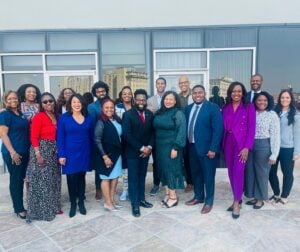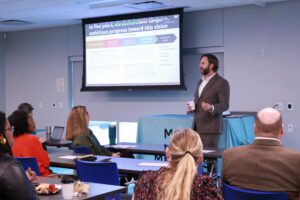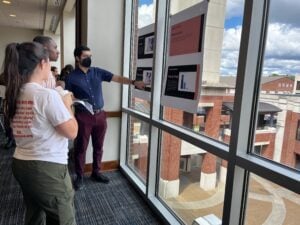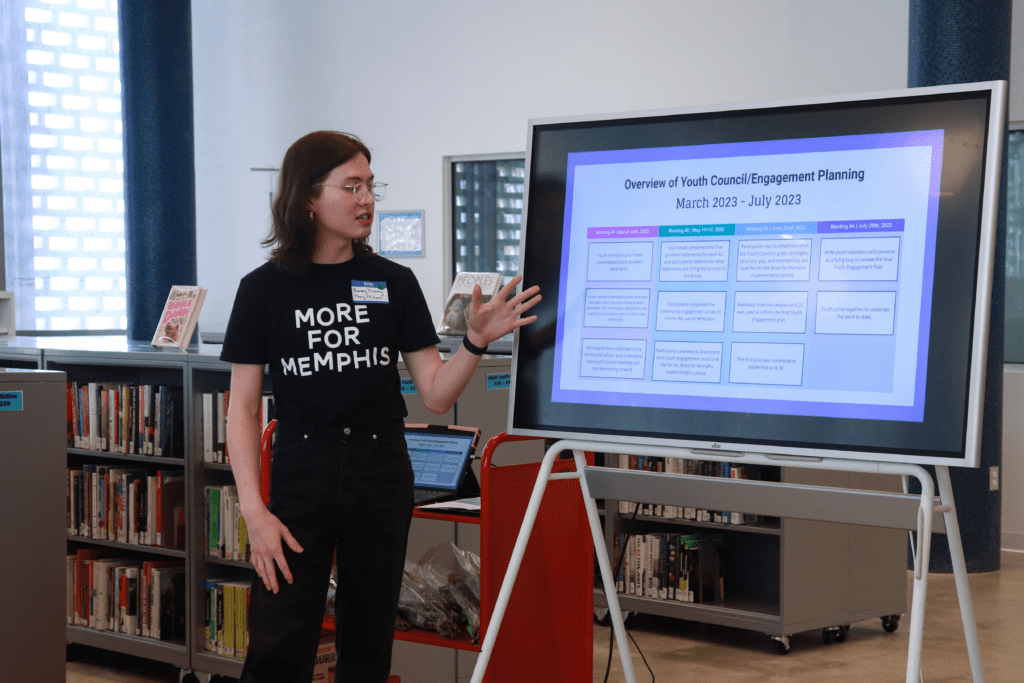Memphis and Shelby County, in Tennessee, make up a region steeped in rich cultural heritage and vibrant community spirit. Amidst this cultural wealth, the region has demonstrated resilience in overcoming longstanding challenges within its educational landscape. The community fosters a collective determination to ensure opportunities for all youth and families.

Seeding Success staff, More for Memphis planning partners, and Blue Meridian Partners team members attend the William Julius Wilson Institute convening “Power of Place: The Science of Cradle to Career.”
Seeding Success, a collaborative of community partners in Memphis and Shelby County, is enabling this regional work by driving policy efforts that create pathways for economic mobility. Through strategic collaborations, data-driven decision making and community engagement, this Cradle to Career Network member is catalyzing the empowerment of young people and families to thrive and contribute to the region’s continued prosperity.
Driving policy reforms through collaboration
For over a decade, Seeding Success has played a pivotal role in convening educational partners and fostering collaborative efforts. With a focus on cradle-to-career and recently identified cross-sector strategies across six key systems — education, community development, economic development, arts, health and well-being, and safety and justice — Seeding Success has set the stage for meaningful and sustainable change.
One of Seeding Success’ most notable achievements lies in its ability to leverage partnerships to drive policy reforms. A prime example of this is their sustained efforts to secure pre-K funding — a critical component of their comprehensive cradle-to-career approach. Recognizing the imminent loss of 1,000 pre-K spots as federal funding was ending, Seeding Success mobilized a coalition of stakeholders to advocate for local government support. By framing lack of child care as a workforce issue and highlighting its impact on families experiencing poverty, they successfully secured funding. This shift not only saved the existing pre-K spots, but also expanded accessibility by funding spots for another 1,000 students.

Using data as a lever for change
Data-driven decision making is central to Seeding Success’ ability to lead policy change. Whether it’s collecting and analyzing pre-K outcomes with First 8 Memphis or collaborating with Communities In Schools of Memphis to improve long-term financial prospects for students, data serves as the bedrock of their advocacy efforts. By contextualizing education-related data with demographic insights, they’ve been able to identify critical needs and tailor solutions to support communities to reach economic success.

Seeding Success CEO Mark Sturgis explains the 5-year vision for More for Memphis to Memphis’s philanthropic community members. Photo by Tara Fredenburg.
In 2018, Seeding Success led the charge to ensure permanent funding for universal needs-based pre-K in Memphis and Shelby County. Throughout the process, policy staff and organizational leadership engaged with community partners, local politicians and government staff to identify the exact financial and programmatic needs of children and families across the county. First 8 Memphis — a fiscal agent affiliated with Seeding Success — was created to manage the operations of the new locally funded pre-K classrooms. This effort resulted in the passage of a joint ordinance between the Memphis City Council and Shelby County Board of Commissioners to provide up to $20 million per year to ensure access to high-quality pre-K education for students experiencing poverty. Over the past four years, students who have attended these classrooms have experienced higher rates of kindergarten readiness than students in years prior to the establishment of the fund.

Seeding Success’s Director of Policy and Advocacy Anthony Hanna walks partners through economic development data during a More for Memphis coalition meeting. Photo by Tara Fredenburg.
In 2021, it was discovered that approximately $750 million in federal funding from the Temporary Assistance for Needy Families (TANF) and Childcare Development Fund (CCDF) had not been locally distributed. In response to this, Seeding Success policy staff, in coordination with state partners, quickly drafted a proposal to ensure that the funds were received by children and families who need it most. This involved creating a pilot strategy to distribute resources through place-based efforts, and unlocking funds annually for economic mobility initiatives. This strategy was passed unanimously in the state legislature and signed into law. Funds can now be used by organizations and partnerships to increase TANF aligned two-generational strategies and support partnership outcomes.
Similarly, data has played a central role in Seeding Success’ collaboration with Communities In Schools of Memphis and is yielding tangible results in tackling educational challenges. A comprehensive analysis of Communities In of Schools Memphis’ Integrated Student Supports (ISS) initiative had a significant impact on life outcomes. Data revealed that students experiencing poverty who attended ISS schools experienced notable increases in lifetime earnings, with improvements ranging from 12% to 25% for Black and Latine students. This evidence has not only informed educational policy decisions but also resulted in increased funding for ISS programs, which will continue to have positive impacts on students’ long-term economic prospects. Seeding Success successfully leveraged this relationship and historic partnerships to secure the first multi-district Full-Service Community Schools grant in Tennessee, driving $30 million in new resources into six community schools.

Randy Truong leads a youth council planning meeting at the Cossitt Library. Photo by Tara Fredenburg
A community-centered approach to advocacy
As Seeding Success looks ahead to what continued systems change looks like in Memphis, they’re employing a community-centered approach to drive new policy shifts. In one example of this, Seeding Success collaborated with the Community Foundation of Greater Memphis and 300+ multi-sector and neighborhood partners to secure $8.5 million in new national and local investments to establish a plan for improving the long-term quality of life of Memphis and Shelby County residents. Through this More for Memphis plan, they’ve actively engaged youth and families in shaping strategies. By empowering community members to participate in planning, implementation and evaluation, Seeding Success ensures that the voices of the community are heard and valued throughout the process. This inclusive approach not only fosters trust and accountability but also ensures that policies reflect the diverse needs and experiences of the community.
By fostering collaboration, leveraging data to drive change and centering community voice, Seeding Success is setting a precedent for how place-based partnerships can effectively address systemic challenges and improve outcomes. This work has recently garnered their partnership the Systems Transformation designation along the StriveTogether Theory of Action™. Explore how other communities are transforming systems across the Cradle to Career Network.






